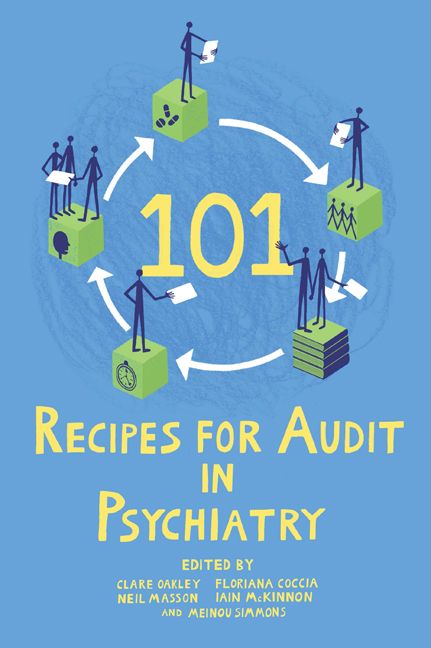IV - Record-keeping
Summary
Setting
This audit was conducted in three general adult psychiatric in-patient units, including a psychiatric intensive-care unit. It would also be suitable for older-adult or forensic in-patient settings.
Background
Research has shown that in general hospitals 20–30% of men and 5–10% of women admitted are ‘problem drinkers’ (Seppä & Mäkelä, 1993). A higher proportion of alcohol misuse and dependence is found among psychiatric in-patients. Hulse et al (2000) found high rates of alcohol dependence among psychiatric in-patients using the AUDIT questionnaire: they found that 60% of men and 40% of women admitted to a general psychiatric unit had a level of alcohol consumption that was harmful or hazardous or were alcohol dependent.
Withdrawal from alcohol is associated with significant morbidity and mortality. Therefore, it is essential to identify patients who are admitted with alcohol dependence early, so they can be appropriately managed.
Standards
At the time of the audit, the trust's handbook for junior doctors did not include an alcohol history as a minimum standard for admission clerking. It was felt that, where possible, an alcohol history should be taken within the first 24 hours of admission. The alcohol history should contain:
▸ quantity of alcohol consumed over a set period (e.g. weekly)
▸ if the patient is taking alcohol daily, an enquiry about the presence of withdrawal symptoms
▸ if symptoms of dependence are recorded, an enquiry about any history of seizures on withdrawal
▸ details of any previous attempts at detoxification (when, where, complications, etc.)
These standards were devised using ‘Assessment of the patient with alcohol problems’ from the Oxford Handbook of Psychiatry (Semple et al, 2005).
Method
Data collection
The clinical notes of all in-patients in three hospitals were reviewed. The admission clerking and medical and nursing entries for the first 24 hours following admission were checked for entries regarding alcohol history.
Data analysis
The following information was collected from each set of notes:
▸ gender
▸ ethnicity
▸ date of admission
▸ Mental Health Act status
▸ whether an alcohol history was taken within the first 24 hours.
If an alcohol history was recorded:
▸ whether symptoms of dependence were enquired about
▸ whether alcohol dependence was present
▸ if present, whether appropriate management was initiated.
- Type
- Chapter
- Information
- 101 Recipes for Audit in Psychiatry , pp. 107 - 132Publisher: Royal College of PsychiatristsFirst published in: 2017



